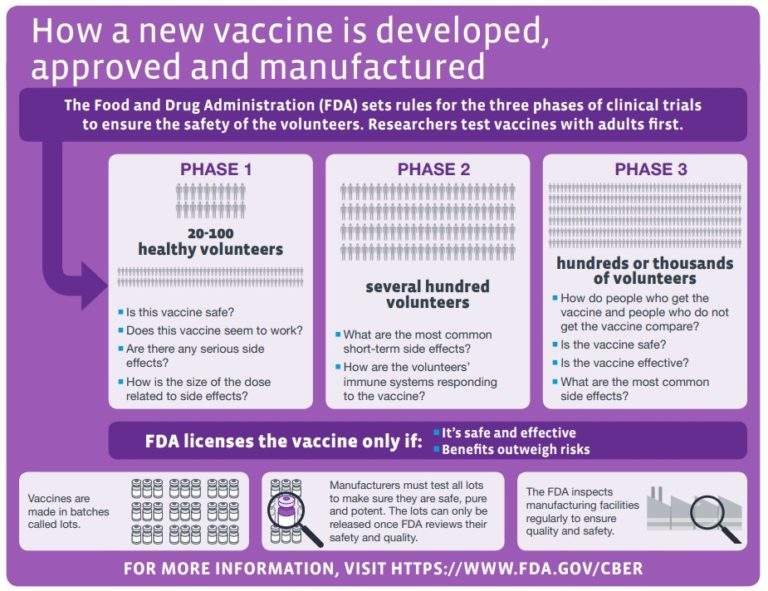mRNA Vaccines
Instead of putting a weakened or inactive virus or bacteria into the body, mRNA vaccines inject a harmless protein (the mRNA) into the body. The mRNA stimulates the body’s cells to make a small piece of a protein called the spike protein – a protein found on the surface of the COVID-19 virus. The creation of the spike protein causes the body to trigger an immune response, just as it does for any foreign material introduced into the body. Part of this immune response produces antibodies which are essential in protection from the virus.
Two common misconceptions are: (1)the vaccine can give an individual COVID-19 and (2)it changes an individual’s DNA. The CDC reports both statements to be false. The two mRNA COVID-19 vaccines do not contain the live virus (they only contain a small part of the virus), meaning they cannot give someone COVID-19. The vaccines also do not change an individual’s DNA after receiving the injection since the mRNA never enters the nucleus of the cell, and mRNA cannot alter DNA. The mRNA remains active for several days to generate antibodies and other parts of the immune response, then breaks down and does not remain in the body.
CDC Reference
Additional Resource about mRNA Vaccines
Moderna & Pfizer-BioNTech Comparison

As noted in the comparison above, there are very subtle differences between the two vaccines. These minor differences should not build a preference for receiving one vaccine versus another, unless there are other reasonings after reviewing the manufacturers information.
Additional CDC References: Moderna & Pfizer-BioNTech
Herd Immunity Benefits
Vaccination of others in the community makes vaccination more efficacious to an individual, a concept called herd immunity. While the exact percentage of people who need to be vaccinated with the COVID-19 vaccine for herd immunity is not yet known, estimates are between 70-90%. Herd immunity makes virus spreading through a population more difficult as immunized individuals cannot contract and spread the virus. Herd immunity may also protect those who are not eligible for a vaccine, such as newborns. Although we are not sure if we can achieve full herd immunity, even rates below full immunity can be beneficial. As we focus on the different groups and furthering the amount of people vaccinated, we hope to see positive results of decreased numbers of infected people.
New information about the COVID-19 vaccines is available daily. In today’s environment, it is imperative to stay abreast with COVID-19 data tracking, how the healthcare system is responding (nationally, statewide and locally) and any changes. There are a number of tools and resources available to healthcare providers. Take a look at several we’ve found most interesting below.
COVID-19 Vaccine Resources
CDC: Answering Patient Questions (For Clinicians)
Pfizer-BioNTech Vaccination Storage & Dry Ice Safety Handling
Note: This information is published as of January 2021. Please refer to the Centers for Disease Control website for the most up to date resources.






